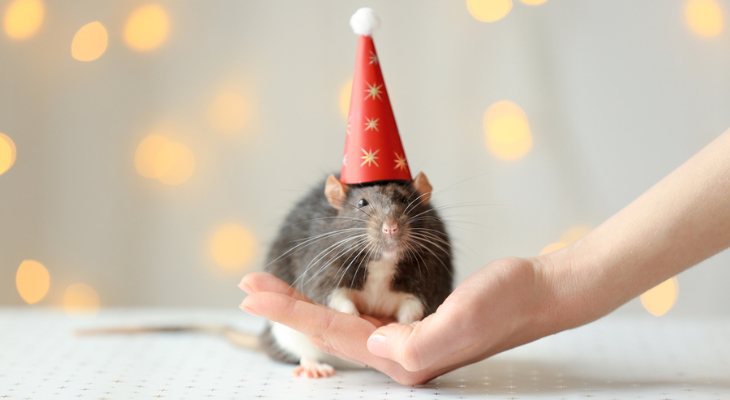
Do Pocket Pets Need Regular Exams?
Is an appointment with the veterinarian on your pocket pet's calendar this year? All pets, regardless of their size, need to see the veterinarian at least once a year.
The Benefits of Veterinary Care
Called pocket pets because they're so small they could fit in a pocket, these cute pets may appear on the outside to be fairly self-sufficient. Whether you have a guinea pig, hamster, gerbil, rabbit, chinchilla, hedgehogs, sugar glider, mouse, or rat, your pet needs more than just food, water, and a clean cage. Regular veterinary care is a must. Without it, your pet may suffer unnecessarily if it develops an injury or illness. Benefits of regular veterinary visits include:
- Prompt Treatment for Illnesses. Although it's true that pocket pets have shorter lifespans than dogs and cats, many of them die too soon because they don't receive veterinary treatment when they first become ill. It's not always easy to tell that your pet is sick, as pocket pets may hide signs of illness. Regular exams help your pet's veterinarian spot potential or current health issues and offer treatments that will improve your little friend's health.
- Diagnosis of Common Health Problems. Pocket pets, depending on their type, are prone to developing several serious or chronic health issues. Rabbits are more likely to develop respiratory tract infections, while a vitamin C deficiency can cause a health problem similar to scurvy in guinea pigs. During annual exams, your veterinarian checks for signs of the diseases or illnesses common in your type of pocket pet.
- Dental Care. The teeth of rabbits, guinea pigs, gerbils, hamsters, rats, and mice never stop growing. Chewing on leafy greens, hay, untreated wood, and chew toys usually prevents tooth overgrowth. Unfortunately, sometimes teeth grow too long even if you provide ample chewing opportunities for your pet. Overgrown teeth make it harder to eat and may damage your pet's mouth. If overgrowth is a problem, your pocket pet's veterinarian can trim its teeth during an annual visit. During the exam, he or she will also check for dental abscesses, broken teeth and other dental issues that could affect your pocket pet's health and wellbeing.
- Advice and Recommendations. Annual exams are the perfect time to ask your pet's veterinarian questions about diet, behavior, cages, bedding, health conditions, and other questions about pocket pet care. Thinking about bringing home a friend for your pet? Although some animals just want to be alone, others thrive with cage-mates. Your veterinarian can help you decide if it's a good idea to add another hamster, gerbils, rabbit, mouse, guinea pig, or other pocket pet to your situation.
How to Tell if Your Pocket Pet Is Hurt or Unwell
It's not always easy to tell that a pocket problem is injured or sick. These signs could indicate that your pet needs to see the veterinarian:
- Diarrhea. Diarrhea can be serious in pocket pets, as their small size increases the risk of dehydration or even death. Diarrhea could be related to diet or might be a sign of a more serious problem, like wet tail in hamsters. This bacterial infection is the most common cause of hamster death, according to a research study by the Royal Veterinary College.
- Appearance Changes. Is your pocket pet losing weight or hair? Have you noticed lumps or swelling or other changes? Does your pet have trouble walking? Any change in appearance is a cause for concern. The American Animal Hospital Association recommends checking your pet for lumps and bumps at least once a week.
- Injuries. Cuts, swollen limbs, torn skin on tails, and other injuries also require a trip to the veterinarian. Treating injuries promptly reduces the risk of infection that could threaten your pocket pet's health.
- Breathing Issues. Call your pet's veterinarian right away if it's struggling to breathe. Signs of breathing difficulties could include squeaking sounds, wheezing, or breathing with the mouth open.
- Behavioral Changes. Is your pocket pet not quite as energetic as usual? Does it spend most of its time in its hideout? Just like you, your pet may not feel like playing or socializing when it doesn't feel well.
Has your pocket pet seen the veterinarian lately? Contact our office to schedule an appointment.
Sources:
American Animal Hospital Association: Is a Pocket Pet Right for Me?
https://www.aaha.org/your-pet/pet-owner-education/ask-aaha/is-a-pocket-pet-right-for-you/
Merck Manual: Disorders and Diseases of Guinea Pigs, 10/2022
https://www.merckvetmanual.com/all-other-pets/guinea-pigs/disorders-and-diseases-of-guinea-pigs
PetMD: Gerbil Care Sheet, 3/21/2023
https://www.petmd.com/exotic/gerbil-care-sheet
Royal Veterinary College: Largest Study Reveals Most Common Disorders and Lifespan of Pet Hamsters in the UK, 6/23/2022
